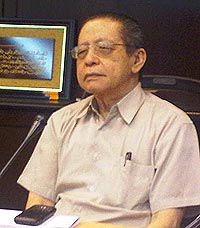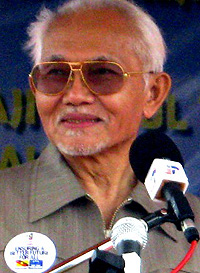One candidate, among the 213 vying for 71 seats in Sarawak's state election, has had the experience of having been deported from Burma.
 See Chee How (
left
), Keadilan (PKR) candidate for Batu Lintang in Kuching, was among 18 foreign human rights activists detained by the Burmese military junta on August 8, 1998.
See Chee How (
left
), Keadilan (PKR) candidate for Batu Lintang in Kuching, was among 18 foreign human rights activists detained by the Burmese military junta on August 8, 1998.
The ten men and eight women were interrogated for five days in jail in Rangoon. Eventually, the Burmese home ministry, in response to international concern, announced the activists would be freed and deported.
The foreigners - six Americans, three Malaysians, three Thais, three Indonesians, two Filipinos and an Australian - were representatives of 13 human rights NGOS from around the Asia-Pacific region.
The activists had been handing out leaflets to ordinary citizens on the streets of Rangoon, promising them the rest of the world had not forgotten the Burmese people's torment.
This act of defiance and solidarity marked the tenth anniversary of the August 8, 1988 uprising in Burma against the military regime, commemorated as ‘Four Eights Day', or 8888.
On that day in 1988, the Burmese army had opened fire on peaceful pro-democracy demonstrators. The official death toll was a few dozen, but human rights groups said thousands had been murdered in the massacre, and in the brutal crackdown that ensued.
The leaflets bore a simple but moving message:
"We are your friends from around the world.
We have not forgotten you.
We support your hopes for human rights and democracy.
8888 - don't forget - don't give up."
 According to the Malaysian opposition leader at the time,
Lim Kit Siang
(
right
), the activists were not "attempting to incite unrest", as the Burmese government had claimed, unless aspirations for democracy, freedom and justice were a crime.
According to the Malaysian opposition leader at the time,
Lim Kit Siang
(
right
), the activists were not "attempting to incite unrest", as the Burmese government had claimed, unless aspirations for democracy, freedom and justice were a crime.
The group of detainees comprised academics, students and lawyers.
They called themselves the Alternative Asean Network on Burma.
One spokesperson said the activists were "well aware they might be arrested", but added that being detained was not their goal.
See recalls that Thai and American diplomats were instrumental in securing the activists' release.
Wisma Putra, he says, was ambivalent about supporting the three jailed Malaysians. In fact, the Malaysian government confiscated See's passport after his return, and he has been unable to travel abroad, ever since 1998.
Today, the door to See's modest office in Kuching carries a sign that reads: "Free Burma Now". He wears his travel restrictions lightly, and shrugs off the inconvenience of being prevented from taking his family for a vacation in Thailand, Indonesia, or further afield.
Death on the Baram River
See confronted death on another occasion, when he joined a civil society fact-finding mission in Baram in 1994. The team was investigating reports of killings and violence perpetrated by logging companies and the security forces against Penan and other Orang Ulu standing peacefully at anti-logging blockades.
The team gathered damning evidence against the loggers and police field force, who had invaded the Baram forests.
But the mission ended in tragedy when the team were wearily making a long journey on the huge Baram river. An outboard engine cut out while their longboat was negotiating the currents, and the boat capsized.
One volunteer, Justin Louis, a video documenter from Pusat Komas, drowned at the age of 30. See and other members survived, by clinging desperately to debris from the boat.
See has honoured Justin's memory. He has persevered in his commitment to the Penan communities. He was a crucial figure in establishing the 2008 national ministerial taskforce probe that confirmed the rape of Penan schoolgirls by loggers in Baram.
After the police refused to investigate the rapes, citing an insufficient budget as an excuse, See and other NGO members of the Penan Support Group (PSG) launched their own fact-finding mission last year.
The PSG report identified political patronage in the logging industry, and the marginalisation and subjugation of the Penan, as the root causes of the sexual abuse.
Land rights and politics
As a partner in Baru Bian Solicitors and Advocates, See has represented Iban, Malays, Bidayuh, and Orang Ulu in over a hundred Native Customary Rights cases. The law firm has won a series of landmark court victories.
The lawyers have offered pro bono assistance, too, to Chinese smallholders threatened with compulsory land acquisition by the government, including those in Bako.
See spearheaded the establishment of two pre-schools for Penan children, funded by donors from throughout Malaysia. See and Baru lobbied for RM90,000 from the Selangor and Penang governments for a four-wheel-drive vehicle to allow Penan children in Baram to travel to school without being attacked by logging company employees.
In 2007, See distributed leaflets on the streets in Kuching, describing a Malaysiakini report on allegations of corruption and kickbacks to Taib's family from Japanese timber importers.
 Taib (
right
) was unable to deport him like the Burmese military did in 1998, but he did file a defamation lawsuit against See and
Malaysiakini.
The case drags on in the courts.
Taib (
right
) was unable to deport him like the Burmese military did in 1998, but he did file a defamation lawsuit against See and
Malaysiakini.
The case drags on in the courts.
When asked about See's NGO work, Muhin Urip, a local land rights NGO leader, replied: "For those in a position to search the internet, it's easy enough. Google his name, and you'll see a record of a person who has been consistent, someone who has always stood up for others.
"Chee How's involvement in Sarawak and Burma is consistent with his belief in championing the rights of minorities, and speaking out against dictators. He's a humble person, and yet he's courageous. He risks himself but doesn't seek publicity, nothing for himself," he smiled.
"He's travelled to the most remote parts of the state, serving Sarawakians. There are no barriers to his reaching out to others - not race, language, distance, physical difficulties. Not even fear."

